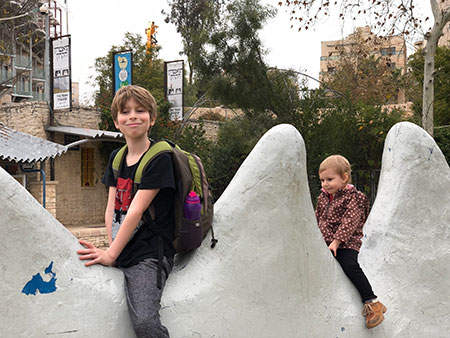Being Jewish
Commentary
Forging Hebrew Links to Israel for My Children

I remember when I first felt like an outsider in Israel. It was several years ago, when I was with my then-3-year-old son in a south Jerusalem playground and another child approached him with a ball and asked: “Rotze lesachek iti?” (do you want to play with me). My son looked up briefly and then continued to play with his toy truck. I politely explained to the boy that Yannai didn’t speak Hebrew. The boy’s father and I made an awkward attempt to facilitate a wordless interaction between the kids, but without a shared language, neither of them was enthusiastic. I felt an unexpected sense of loss.
I made aliyah to Israel from Russia as a teenager, and the country quickly became home to me. I never doubted my relationship with it even when, seven years later, I left for graduate studies abroad, together with my husband, Philip, who was also a Russian-born Israeli. Our academic careers took us to Canada and then the United States, where our son was born. But every year when we came to visit our families in Israel, I never doubted that we were coming “home.”
Until that moment on the playground, when I realized that my son could not communicate with an Israeli child.
When Yannai was born, Philip and I considered speaking to him in both Russian and Hebrew, but quickly abandoned the daunting prospect of maintaining two home languages, in addition to English. Our son grew up speaking Russian and English. I had taken my own ties to Israel for granted, but even though I am a linguist, I had failed to understand that without Hebrew my son would not have the same connection with the country.
After the playground incident, I decided that Yannai needed to learn Hebrew. I knew we had missed the best opportunity to teach the language—from birth. He was too young for formal instruction, and our family life was disrupted every few years as my husband and I found ourselves moving for our academic careers.
But I never gave up. When Yannai was 4 and we were living in Canada again, I spoke to him in Hebrew a little bit every day. But we didn’t progress beyond basic phrases such as eich korim lecha? (what’s your name) and ani yeled (I’m a boy). When he was 5 and we had settled in Britain, I took him to an ulpan class in an Israeli Sunday school in London. But two hours a week did not make my reluctant learner a Hebrew speaker.
One day, I took a crocodile puppet from his pile of plush toys and declared that it spoke only Hebrew. Not to be fooled, Yannai shook his head and said very seriously, “No, Mama, all our toys speak Russian.” On our next trip to Israel, I bought a rooster puppet in Jerusalem and introduced him to my son as a Hebrew speaker. Unlike with the crocodile, he didn’t question the rooster’s language abilities—but he didn’t make friends with him, either.
Yannai was approaching his sixth birthday knowing very little Hebrew—and I was running out of ideas.
The solution came unexpectedly in the last weeks of my second pregnancy. During our long trip home from the Israeli Sunday school, I had a light bulb moment: If I taught the new baby to speak Hebrew, eventually Yannai would join in, too. So, when my daughter, Maya, was born, I exclusively spoke Hebrew to her.
We made breakfast in Hebrew and played in Hebrew. We read books and made up stories in Hebrew. We cleaned up and went to bed in Hebrew. I never insisted that Yannai join in, but I made sure to speak in his presence, and I knew he was listening.
On a recent trip to Israel, I found myself with my kids, now aged 8 and 2, in the same playground that once made me feel like an outsider. This time, Maya made her first Israeli friend. Both toddlers were proudly clutching their sunhats in their fists, the Israeli girl yelling in Hebrew, “Kova sheli!”(my hat) and my daughter yelling back, “Kova sheli!”
And her brother? He may not be fluent yet, but now that he is encircled by a mother and sister who communicate in Hebrew, he has no choice but to use the language. When Maya sneezes, Yannai says “labriyut.” When she cries, he asks me, “How do you say, ‘Mommy is coming soon’ in Hebrew?” And when he wants her not to touch his tablet, he yells in the language she knows best: “Zeh sheli!” (it’s mine).
And I know that as long as my kids keep arguing in Hebrew, Israel will in some ways be their home, too.
Tanya Mozias Slavin is a freelance writer and linguist living in Britain.









 Facebook
Facebook Instagram
Instagram Twitter
Twitter
Leave a Reply